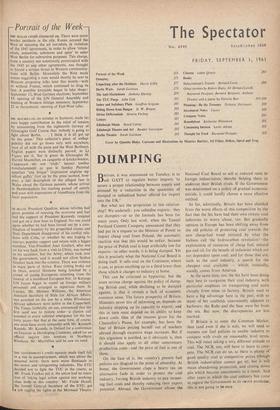DUMPING
BRITAIN, it was announced on Tuesday, is to ask GATT to regulate butter imports 'to secure a proper relationship between supply and demand by a reduction in the quantities of dumped or subsidised butter offered for import into the UK.'
But what are the proprieties in this relation- ship? We undersell: you subsidise exports: they are dumpers—or so the formula has been for many years. Only last week, when the Tunnel Portland Cement Company announced that they had put in a request to the Minister of Power to import cheap coal from Poland, the automatic reaction was that this would be unfair, because the price of Polish coal is kept artificially low for exports—in other words, it is being dumped. Yet this is precisely what the National Coal Board is doing itself. It sells coal on the Continent; where it can, at prices anything up to a third lower than those which it charges to industry at home.
This can be criticised as hypocrisy; but the more serious charge against the policy of dump- ing British coal, while declining to be dumped against, is that it reveals a lack of economic common sense. The future prosperity of Britain, Ministers never tire of informing us, depends on industry stepping up its capacity to export; and this in turn must depend on its ability to keep down costs. One of the reasons given for the Chancellor's Pause, for example, has been the fear of Britain pricing herself out of markets abroad through excessive wage increases. But if this argument is justified, as it obviously is, then it should also apply to all other unnecessary production costs—and the price of fuel is one of them.
On the face of it, the country's present fuel policies are illogical to the point of absurdity. At home, the Government claps a heavy tax on alternative fuels in order to protect the coal industry, forcing British industry to pay mount- ing fuel costs and thereby reducing their export potential. Abroad, the Government allows the National Coal Board to sell at reduced rates to foreign industrialists, thereby helping them to undercut their British rivals. If the Government was determined on a policy of gradual economic suicide, it could hardly choose a more effective method.
So far, admittedly, Britain has been shielded from the worst effects of this competition by the fact that the Six have had their own rickety coal industries to worry .about, too. But gradually Opinion in Europe has been shifting away from the old policies of protecting coal towards the new cheap-fuel trend initiated by what the Italians call 'the hydrocarbon revolution'—the exploitation of resources of cheap fuel, natural gas and oil, for the benefit of industries which are not dependent upon coal; and for those that are, such as the steel industry, a search for the cheapest coal available — which, ironically, usually comes from America.
At the same time, too, the Six have been doing their best to reorganise their coal industry, with particular emphasis on transporting coal more cheaply from mine to factory. Britain used to have a big advantage here in the past, with so many of her coalfields conveniently adjacent to harbours; the Ruhr and the Saar were far from the sea. But now, the discrepancies are less marked.
If Britain is to enter the Common Market, then (and even if she is not), we will need to reassess our fuel policies to enable industry to compete with rivals on reasonably level terms. This will mean taking a very different attitude to coal. The NCB, too, will have to learn to com- pete. The NCB can do so, as there is plenty of good quality coal at competitive prices (though British industrialists cannot get it); but it will mean abandoning protection, and closing down pits which becotile uneconomic as a result. And after years in which the coal industry has come to regard the Government as its sworn protector, this is not going to be easy.


































 Previous page
Previous page